
Gut and Liver
Scope & Guideline
Connecting science and practice in digestive health.
Introduction
Aims and Scopes
- Gastrointestinal and Hepatic Oncology:
Research focusing on cancer types affecting the gastrointestinal tract and liver, including gastric, colorectal, and hepatocellular carcinomas, with studies exploring prevention, diagnosis, and treatment outcomes. - Microbiome and Gut Health:
Investigation into the role of gut microbiota in health and disease, including its impact on conditions such as inflammatory bowel disease (IBD), colorectal cancer, and metabolic disorders. - Endoscopic Techniques and Innovations:
Studies on the development and application of advanced endoscopic techniques for diagnosis and treatment, emphasizing procedural efficacy, safety, and patient outcomes. - Nutritional and Metabolic Factors in Gastrointestinal Diseases:
Research exploring the influence of dietary patterns, nutritional deficiencies, and metabolic conditions on gastrointestinal health and disease progression. - Chronic Liver Diseases and Hepatitis Management:
Focus on chronic liver conditions, particularly hepatitis B and C, including their epidemiology, management strategies, and long-term outcomes. - Clinical Guidelines and Best Practices:
Dissemination of evidence-based clinical guidelines and recommendations for the management of various gastrointestinal and liver diseases, aimed at improving patient care.
Trending and Emerging
- Precision Medicine in Gastroenterology:
An increasing focus on personalized treatment strategies based on genetic, microbiomic, and clinical profiles, particularly in the management of chronic diseases like IBD and liver conditions. - Impact of Gut Microbiota on Disease:
Growing research into how gut microbiota influences various gastrointestinal diseases, including its role in cancer risk, inflammation, and metabolic disorders. - Advanced Endoscopic Techniques and Technologies:
Emerging technologies in endoscopy, including robotic-assisted procedures and novel imaging techniques, are gaining attention for their potential to improve diagnostic accuracy and treatment efficacy. - Nutritional Interventions and Dietary Modifications:
A trend toward investigating dietary impacts on gastrointestinal health, with studies exploring the role of specific diets in disease prevention and management. - Longitudinal and Population-Based Studies:
An increase in large-scale, longitudinal studies that track disease progression and outcomes over time, providing valuable insights into chronic conditions and their management.
Declining or Waning
- Traditional Pharmacological Treatments for IBD:
There has been a noticeable decrease in studies focusing solely on conventional pharmacological approaches for inflammatory bowel disease, as newer biologic and targeted therapies gain prominence. - Basic Science Research in Gastrointestinal Pathophysiology:
Research dedicated to basic science mechanisms in gastrointestinal diseases appears to be less frequent, possibly due to a shift towards translational and clinical research. - Single Center Studies:
The prevalence of single-center studies is declining in favor of multicenter and collaborative research efforts, which provide broader data and enhance the generalizability of findings. - Non-invasive Diagnostic Techniques:
Interest in non-invasive diagnostic approaches, such as imaging and serological tests, seems to be waning, potentially overshadowed by advancements in endoscopic and invasive techniques.
Similar Journals

PRACTICAL GASTROENTEROLOGY
Delivering Practical Solutions for Gastrointestinal HealthPRACTICAL GASTROENTEROLOGY is a distinguished journal dedicated to the field of gastroenterology, published by Shugar Publishing Inc in the United States. With an ISSN of 0277-4208, the journal serves as a pivotal resource for medical professionals, researchers, and students keen on staying abreast of the latest advancements and practical applications in gastrointestinal health. Although it does not currently operate under an Open Access model, it has been a respected publication since its inception, spanning significant years of research from 1989 to 2013 and resuming again from 2016 to 2023. Despite holding a current Q4 ranking in Gastroenterology with Scopus, its commitment to quality insights provides a platform for critical information dissemination, making it an essential read for those engaged in clinical practice and academic research. The journal’s objectives include addressing practical challenges in gastroenterology, bridging the gap between research and clinical implementation, and fostering ongoing education among practitioners in this dynamic field.
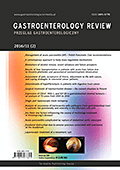
Gastroenterology Review-Przeglad Gastroenterologiczny
Pioneering Insights in Gastrointestinal MedicineGastroenterology Review-Przeglad Gastroenterologiczny is a premier, peer-reviewed journal published by TERMEDIA PUBLISHING HOUSE LTD, focusing on the dynamic field of gastroenterology. Since its inception in 2006, it has embraced an Open Access model, ensuring that the latest research is readily accessible to a global audience, fostering collaboration and innovation. Based in Poland, this journal serves as a crucial platform for disseminating significant findings in gastrointestinal research, with a current Scopus rank placing it at the 39th percentile in its category. With a commitment to advancing the understanding of gastroenterological conditions, *Gastroenterology Review* publishes original articles, reviews, and case studies that contribute to both clinical practice and academic research. The journal is particularly aimed at researchers, healthcare professionals, and students who ignite dialogues that shape the future of gastrointestinal health. Explore the comprehensive insights that this journal offers, as it encapsulates vital developments from 2008 to 2024 in the ever-evolving landscape of gastroenterology.

Gastrointestinal Disorders
Empowering Professionals with Cutting-Edge GI ResearchGastrointestinal Disorders is a prominent open-access journal published by MDPI, based in Switzerland, that focuses on the latest research and innovations in the fields of gastroenterology, hepatology, and immunology. Since its inception in 2019, the journal has provided a vital platform for researchers and professionals to disseminate their findings, engaging with a global audience keen on advancing knowledge in gastrointestinal health. With a dedicated commitment to high-quality, peer-reviewed articles, Gastrointestinal Disorders has gained recognition in 2023, achieving Q3 status in gastroenterology and notable rankings in several other categories, including a respectable position in the quartiles for hepatology, immunology, and oncology. Despite its recent establishment, the journal has quickly become a valuable resource, facilitating open access to critical insights in the study of gastrointestinal diseases and their management, ensuring that emerging research is readily available to inform clinical practice and educate future professionals.
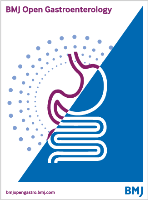
BMJ Open Gastroenterology
Connecting Researchers for a Healthier Gastrointestinal FutureBMJ Open Gastroenterology is a premier open access journal published by the esteemed BMJ Publishing Group, focusing on the dynamic and evolving field of gastroenterology. Established in 2014, the journal has rapidly ascended in stature, reflected in its impressive 2023 Q1 ranking in gastroenterology and its position within the top 25% of journals in the category according to Scopus. With a mission to disseminate high-quality, peer-reviewed research with global significance, the journal provides a vital platform for researchers, professionals, and students alike to share their findings and advancements in gastrointestinal medicine. Operating from its headquarters in London, England, the journal's open access format ensures wide visibility and accessibility of cutting-edge research, making it an invaluable resource for those dedicated to improving patient care and driving innovation in gastroenterological sciences. By engaging with this journal, contributors and readers can stay at the forefront of critical developments in the field, fostering a collaborative environment for knowledge exchange.
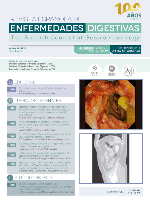
REVISTA ESPANOLA DE ENFERMEDADES DIGESTIVAS
Transforming gastroenterology with cutting-edge research.REVISTA ESPANOLA DE ENFERMEDADES DIGESTIVAS, a pivotal Open Access journal published by ARAN EDICIONES, S A, has been at the forefront of advancing the field of gastroenterology since its inception in 1990. With a robust commitment to disseminating high-quality research, the journal provides a platform for researchers, clinicians, and students to share innovative findings and insights concerning digestive diseases. The journal is characterized by its Q3 ranking in both Gastroenterology and Miscellaneous Medicine categories, indicative of its significant contributions to these fields, and is positioned within the 36th percentile of Scopus rankings for medicine related to gastroenterology. Based in Spain, REVISTA ESPANOLA DE ENFERMEDADES DIGESTIVAS has embraced the Open Access model since 2004, ensuring that its articles are readily available to a global audience without financial barriers. The journal not only supports academic discourse but also plays a crucial role in improving clinical practices and health outcomes related to digestive health.
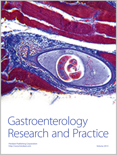
Gastroenterology Research and Practice
Connecting Researchers for a Healthier TomorrowGastroenterology Research and Practice is a leading Open Access journal dedicated to advancing the field of gastroenterology and hepatology. Published by HINDAWI LTD, this journal offers a platform for researchers, clinicians, and healthcare professionals to share their findings and insights on cutting-edge topics in digestive health. With an ISSN of 1687-6121 and an E-ISSN of 1687-630X, it has established its significance within the academic community, evidenced by its ranking in the 2023 Scopus metrics, where it is positioned in the third quartile for both gastroenterology and hepatology disciplines. The journal is recognized for disseminating high-quality, peer-reviewed articles that contribute to the understanding of gastrointestinal disorders, therapeutic advancements, and innovative practices. Since its inception as an Open Access journal in 2008, Gastroenterology Research and Practice has removed barriers to access, ensuring that vital research reaches a global audience. This ongoing commitment to increasing accessibility, alongside its continuous publication from 2009 to 2024, underscores its importance as a resource for the academic and clinical communities striving to improve patient outcomes in digestive diseases.

Gastroenterology Insights
Transforming Insights into Impactful DiscoveriesGastroenterology Insights is a premier open-access journal published by MDPI since 2009, focusing on essential research and developments within the fields of gastroenterology and hepatology. With a dedicated ISSN of 2036-7414 and E-ISSN 2036-7422, this journal serves as a vital platform for disseminating innovative studies and insights pertinent to gastrointestinal health, disorders, and treatment modalities. Based in Switzerland, Gastroenterology Insights boasts a significant academic presence, currently positioned in the Q3 quartile for both gastroenterology and hepatology categories as of 2023, reflecting its impactful contributions to the disciplines. With Scopus rankings placing it at the 94th and 48th positions in gastroenterology and hepatology respectively, the journal is committed to advancing knowledge and fostering collaboration among researchers, professionals, and students alike. By providing an open-access model, it ensures that high-quality research is accessible globally, thereby enhancing the reach and impact of crucial findings in the science of digestive health. Researchers looking to publish cutting-edge work will find Gastroenterology Insights a valuable resource for both sharing and acquiring knowledge.
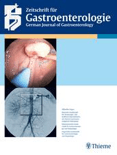
ZEITSCHRIFT FUR GASTROENTEROLOGIE
Exploring the Frontiers of Gastroenterology ResearchZEITSCHRIFT FUR GASTROENTEROLOGIE, published by GEORG THIEME VERLAG KG, stands as a notable journal in the field of gastroenterology since its inception in 1971. With an ISSN of 0044-2771 and an E-ISSN of 1439-7803, this journal focuses on advancing knowledge and research in gastrointestinal health. Operating from Germany, its contributions span various aspects of gastroenterology, providing a platform for both established and emerging scholars to share their findings. As of 2023, ZEITSCHRIFT FUR GASTROENTEROLOGIE is ranked in the Q3 quartile in Gastroenterology and Q4 in Medicine (miscellaneous), reflecting its critical yet developing role in the academic community. Despite its current Scopus rank of #117 out of 167 in the gastroenterology category, the journal aims to foster innovative research and discussions vital for tackling contemporary challenges in gastrointestinal medicine. While it does not offer open access, the journal's extensive archival rigor ensures that pertinent studies remain accessible to professionals and academicians seeking to deepen their understanding and engage with evolving clinical practices.
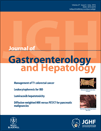
JOURNAL OF GASTROENTEROLOGY AND HEPATOLOGY
Elevating standards in gastrointestinal and liver disease research.Welcome to the JOURNAL OF GASTROENTEROLOGY AND HEPATOLOGY, an esteemed publication in the field of gastroenterology and hepatology, proudly published by WILEY. Established in 1986, this journal serves as a crucial platform for researchers, healthcare professionals, and students, presenting groundbreaking research and comprehensive reviews that drive advances in understanding and treating gastrointestinal and liver diseases. With a strong reputation evidenced by its Q1 ranking in gastroenterology and Q2 ranking in hepatology, this journal ranks impressively in the Scopus metrics - positioned at #22 out of 167 in gastroenterology and #21 out of 82 in hepatology, reflecting its contribution to scholarly excellence. Although it does not offer open access options, the journal’s rich archive and diverse topics make it indispensable for those dedicated to improving patient outcomes in these critical areas of medicine. Whether you are a seasoned researcher or an aspiring medical professional, engaging with this journal will keep you at the forefront of the latest developments and emerging trends in gastroenterology and hepatology research.

JOURNAL OF PEDIATRIC GASTROENTEROLOGY AND NUTRITION
Leading the way in pediatric gastroenterology and nutrition advancements.Journal of Pediatric Gastroenterology and Nutrition is a premier academic journal published by Wiley, focusing on the critical intersection of pediatric gastroenterology and nutrition. Established in 1982, this journal has been at the forefront of research and clinical practices for over four decades and continues to contribute invaluable insights to the fields of pediatrics and gastrointestinal health, boasting a Q1 ranking in Pediatrics, Perinatology and Child Health and a Q2 ranking in Gastroenterology as of 2023. The journal features a comprehensive array of original research, review articles, and clinical studies aimed at improving the understanding and management of pediatric gastrointestinal disorders and nutrient imbalances. Edited with expertise, the Journal of Pediatric Gastroenterology and Nutrition serves as an essential resource for clinicians, researchers, and students dedicated to advancing the well-being of children with digestive health issues. Readers can access the journal's impactful research studies through traditional subscriptions.